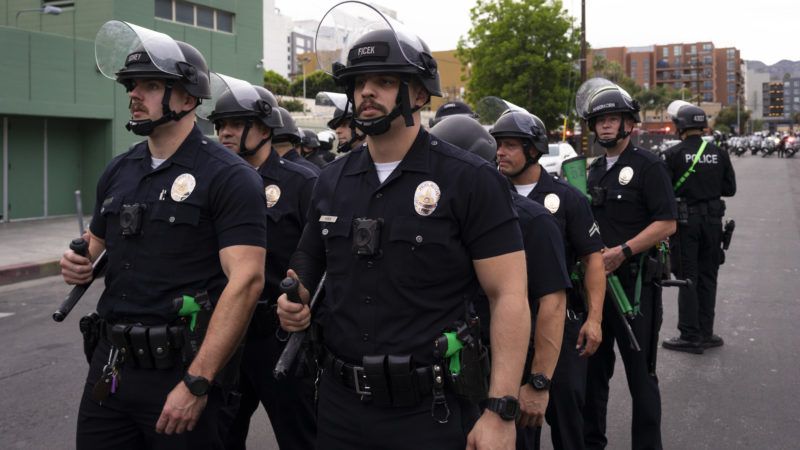A Senate Republican Has Officially Come Out Against Qualified Immunity
The legal doctrine frequently allows police officers to violate your rights without fear of civil liability.

Sen. Mike Braun (R–Ind.) on Tuesday unveiled a bill to curtail qualified immunity, the legal framework that allows public officials to skirt civil liability for violating your rights if those rights have not been carved out explicitly in a pre-existing court precedent.
Somewhat ironically, the Supreme Court created the doctrine in spite of a federal statute. Although Section 1983 of Title 42 of the U.S. Code allows you to sue state actors for civil rights violations, Pierson v. Ray (1967) introduced a "good faith" exception in such cases. In Harlow v. Fitzgerald (1982), the Supreme Court exchanged that "good faith" exemption for the "clearly established" standard, which says that state actors are entitled to qualified immunity if the conduct that they're being sued over did "not violate clearly established statutory or constitutional rights."
In practical terms, the "clearly established" threshold is nearly impossible to meet. And that has had deleterious effects on holding public officials, particularly police officers, accountable for conduct that would land most civilians in jail. Cops have been granted qualified immunity for shooting a 10-year-old and a 15-year-old, stealing $225,000, assaulting and arresting a man for standing outside of his house, and siccing a dog on a surrendered suspect, among other offenses—all because a near-identical scenario had not been outlined in previous case law.
"Without any direction from Congress, our judicial branch has unilaterally created and defined qualified immunity. It's time Congress does their job to establish a qualified immunity law that defends law enforcement, while protecting the rights of the people," Braun said in a statement. "To claim qualified immunity under the Reforming Qualified Immunity Act, a government employee such as a police officer would have to prove that there was a statute or court case in the relevant jurisdiction showing his or her conduct was authorized: a meaningful change that will help law enforcement and the citizens they protect."
Unlike the bill introduced by Rep. Justin Amash (L–Mich.), Braun's proposed legislation does not end qualified immunity, though it does come close. The senator provides exceptions for those whose conduct was expressly permitted under federal regulation, federal statutes, and state statutes, and for those whose conduct was expressly permitted under relevant case law. It also requires that they show they were acting in good faith.
In other words, it essentially turns the Supreme Court's logic on qualified immunity upside-down. The bill excuses alleged misconduct when the courts have previously weighed in on the rights violation in question. Current qualified immunity doctrine basically excuses bad behavior when the judiciary has not rendered a similar decision—a grueling hurdle for any would-be plaintiff.
"Senator Braun's compromise proposal preserves immunity in those relatively rare—but more sympathetic—cases in which defendants are specifically acting in accordance with clearly established law," writes Jay Schweikert, a policy analyst at the Cato Institute, "but it would still have a major effect on run‐of‐the‐mill civil rights claims, which are typically fact and context‐specific and would not fall within one of these 'safe harbor' provisions."
The bill would reform qualified immunity for all public officials—not just cops. In that vein, it goes farther than House Democrats' proposed legislation, which only eliminates the protections for law enforcement. Braun's bill also includes a provision that would hold municipal governments accountable directly when their civil servants are found to have violated someone's rights. It's not unheard of for plaintiffs to sue the city concurrently when filing against a public official, but those claims are sometimes even more difficult to justify in court. Schweikert notes that this portion carries "pretty major financial implications" and may be a dealbreaker.
Even so, up until quite recently, qualified immunity has been a tough sell for Republicans, who distanced themselves from the reform after President Donald Trump made clear that he would veto such legislation. Sen. Tim Scott (R–S.C.) said eliminating qualified immunity would be a "poison pill." Attorney General William Barr claimed it would result in police "pulling back." White House press secretary Kayleigh McEnany called it a "non-starter."
But the tide seems to be turning, with some GOP senators expressing a tepid willingness to consider changes. Though Braun is the first to come forward with an official proposal, Sen. Lindsey Graham (R–S.C.) has expressed a desire to look further. "One thing I can tell you: If you're subject to being sued, you act differently than if you're not," Graham said in a Senate hearing last Tuesday. "Let's take a look at it."
That the GOP has been hesitant to back such reforms isn't surprising from a strategic perspective, but it's ironic when considering the party's ostensible principles. Republicans condemn judicial activism, yet qualified immunity epitomizes legislating from the bench. But more so, conservatives rally around the idea that abusive government institutions must be checked to protect the public's freedom. They would be right, and they can start with reforming qualified immunity.


Show Comments (65)